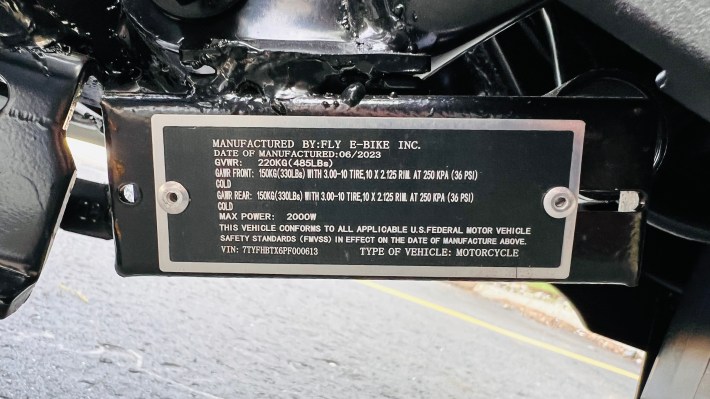The New York State Department of Motor Vehicles will no longer register mopeds made by Fly E-Bike, following a Streetsblog investigation that revealed that the company was selling mopeds that did not meet federal safety standards.
The move to bar new and renewed registrations of Fly mopeds effectively shutters a sizable piece of the company's business because mopeds must be registered at the point of sale in order to be legal, under state law.
Since the state's announcement, electric and gas mopeds have entirely disappeared from the Fly E-Bike website, where they used to be prominent, as the screenshot below shows.

And in the one interview he gave to Streetsblog last year, Fly CEO Ou Zhou posed for a photo surrounded by his company's electric mopeds.
But Streetsblog reporters were unable to find mopeds in Fly E-Bike brick-and-mortar locations during visits to several shops over a recent three-week period. Workers told our reporters that they don't sell mopeds anymore.
The DMV move comes after Streetsblog's investigation earlier this year into the rise of Fly E-Bike. That story included sending one of the company's most-popular mopeds — the Fly-9 — to the accredited vehicle testing firm Applus+ IDIADA.
There are nine Federal Motor Vehicle Safety Standards that apply to mopeds; IDIADA tested the Fly-9 for compliance with five of them. The Fly-9 failed to meet any of those standards.
Previously, however, Fly CEO Ou Zhou had told the DMV, "I certify that the vehicle is properly equipped and is in compliance with all applicable Federal Safety and Emissions Standards."
And a plate on the bottom of the Fly-9 reiterated Ou's boast:

IDIADA found that this is untrue, so we asked DMV, which can only register mopeds that are in compliance with the federal standards, why it granted the Fly-9 model a "Certification of Approval for Limited Use" — and whether the DMV would now revoke that certification.
The agency declined to respond for several months, but eventually got back to us.
"Fly E-Bike has failed to respond to DMV’s request to provide us with documentation that its limited use motorcycles meet Federal Vehicle Safety Standards," agency spokesperson Walter McClure told us four months after our initial query. "As a result, we are no longer allowing new registrations for Fly E-Bike [mopeds] and informing current registrants that they will not be able to renew their registrations going forward."
A downhill run
At its apex of its popularity with delivery workers, Fly E-Bike floated an initial public offering in June 2024 that raised millions for the company and sent the stock soaring to a high of $34.75 per share. But the stock quickly fell back to earth, dropping to $5.85 per share by the end of July 2024. And it continued dropping after Streetsblog's story came out.
Still, the company's woes and evidence of deceptive practices did not dissuade the city Department of Transportation from announcing in February 2025 that it would buy Fly 11 e-bikes — which have certified batteries — for an exchange program to help delivery workers swap out their uncertified bikes and batteries.
It was a questionable move, given that Fly had been fined at the city level and has been in noncompliance with the both the state and the city's regulations around lithium-ion batteries. And later, Streetsblog reported that Fly sold multiple models of e-bikes and electric mopeds with forged UL certification, according to its settlement agreement with UL.
As a result, in June, DOT bailed on the company and lined up a different e-bike for the swap program.
Fly was very much in danger of being delisted by the NASDAQ as its stock price dropped perilously close to $1 late last year and into this year. But this month, the company engineered a "reverse stock split," which reduces the number of outstanding shares. It is often a sign of a company in financial distress.
On Monday, the company announced it had regained compliance by maintaining a $1-per-share closing price for 10 consecutive business days, thanks to the reverse split.
The fiscal year that ended in March 2025 has not been a good one for Fly. In a summary statement posted on July 15, said its net loss for the fiscal year was $5.3 million, compared to net income of $1.9 million in the previous fiscal year.
The company has not responded to requests for comment.






